The next PechaKucha night is on this Thursday 25 August, part of the WORD Christchurch Writers and Readers Festival and the speakers include WORD guests. Some sessions are:
- AJ Fitzwater // Science Fiction and Fantasy Author // Mary Sue vs Strong Female Character
- Debbie Stoller // BUST Magazine founder & Stitch 'n Bitch author // The Handmade's Tale: Why Knitting is a Feminist Issue
- Caitlin Doughty // Progressive Mortician // Our Corpses, Ourselves
- Alok Jha // Science writer // on how the world could end.
I caught up with Netta Egoz, a PechaKucha Night (PKN) organizer, and no ordinary woman. On the contrary. She IS a supergirl. One can not believe all the things she fits in her day. Besides being a full-time lawyer, she's involved in many other projects, like Te Pūtahi - Christchurch Centre for Architecture and City-Making, Project Lyttelton and Social Enterprise Network Ōtautahi. Her legal background, coupled with her passion for creative industries, the Christchurch rebuild, social initiatives, and genuine wish for better and fairer world makes her a rare and precious find. Her skills are well sought after in the city like Christchurch.
We talked about PechaKucha, city-making, law, libraries and the essential components of a successful morning.
You are a solicitor in the day and you are involved in many community projects in your spare time. Your professional and private interests seem very diverse. How do they relate to each other?
They still belong to two separate worlds. A lot of people that I meet outside my work ask me if I am an artist. It is a well-kept secret that I am actually a commercial lawyer. For a long time I felt like I was leading a double life, but pretty quickly I realized I wanted to bring those two worlds together. So that's why I moved to a private sector in my professional career.
I previously worked at community law, which I thought would be a good way of having a middle ground. But the reality is that community law doesn't interact with creative sector, it interacts with people with very high unmet legal needs and often the creativity or arts are luxury for these people. But by being a commercial lawyer I am able to do a lot more work with creative industries. From a business perspective, it is quite smart. There are not many lawyers, who work in this area, so I have a great client base. My work is more interesting because I am helping people, who are doing creative things.
My special area is social enterprise so I work a lot with charities, non-profit organizations and creative industries. I am helping them find the ways to become self-sufficient and be commercial entities as well as creating a common social good. On the other end I do a lot of board governance work, which allows me to be a lawyer for creatives.
I imagine your skills, knowledge and interests are highly valuable, there are not many people like you in Christchurch.
I am not aware of many lawyers who are involved in creative industries. There are a few, who will work pro bono for various creative entities and there are a few who will sit on boards, but I am not aware of any, who runs creative projects like I do, or yet still keep a full-time commercial legal job.
These are two very different worlds. Creative people often do not have time, energy or knowledge to dive into legal issues.
Yes, even more so with commercial law. It's often seen as very dry. I have resisted commercial law for a long time because it didn't seem like the type of law a creative person would do. But increasingly I realized that's where my strength is and that's actually where a lot of creative entities need help. Right through the university I never thought I would be a lawyer, let alone a commercial lawyer. I was always interested in grassroots community, creative movements. I have been running creative events for 10 years now and practicing as a lawyer for 3 years, so my initial engagement was in arts. It's something that has carried through with me and I've managed to still retain it.
Let's talk about one of your creative projects now, PechaKucha. When did you first come across it and how come you decided to organize it here in Christchurch?
PKN has been running in Christchurch for almost nine years and I have been organizing it for three, maybe three and a half years. So PKN transcends me. I first heard about it just before the earthquake – it has an unusual name that sticks in your mind. The first one I went to was the one directly after the quakes and it was one of the few creative events of this type. There was definitely a hole in our city as far as events go. We have lost a lot of them after the quakes. PKN has grown a lot in Christchurch since then as there was a real need for it and it became a real cornerstone of what the Christchurch creative community does.
The first time I got involved was in 2011, when I presented at PKN, volume 12. It was about a project I was doing with my employer at the time, the White Elephant Trust. I was working with Architecture for Humanity on a city youth venue and I was asked to present. I loved it so much, that I decided to volunteer and I stayed with them right through the university. After living overseas, I came back to Christchurch for the job interview and the day I arrived back someone offered me to be PKN city organizer. I thought wow, you just don't get handed a torch like that! Everything fell into place that day, I was given a key to my passion and also to my home in Lyttelton. For so long I was feeling very lost and I felt I needed to move on from Christchurch. But the reality is Christchurch has so much to offer to young creatives. Because we can be so much more important in the city like Christchurch.

It seems to me that PKN in Christchurch is in some way at the core of the rebuild activity. It follows what is happening and reopening in the central city.
I am definitely biased here, but I think we are very important for the social rebuild. Firstly, there's continuity – we existed before the quakes, right through the earthquakes and onwards. There's reliability – it happens four times a year, and the format is the same: 20 seconds for 20 slides. So you know what you're getting. It's eclectic, the speakers are always different, they provide surprises and new information, the venues and themes are always different. We mix people, we had people from Earthquake Recovery talking what they are doing, ordinary residents of Christchurch talking about a small idea they had, artists announcing big projects ... It's a great mix, everyone is on the same stage at the same level, what they have to share is just as important whether it is coming from the government, established creative institutions or just residents of Christchurch who have an idea or a story. It's a mix of introducing new projects, providing information, telling a fictional story, performances ...
So it's got quite an egalitarian nature.
I hope so. I know PKN as a global institution gets compared to TEDx, I think one of the big points of difference is that PKN is more from the bottom up. As organizers, we have some curation, but very limited. It's about people approaching us to perform. No matter who you are, you are given the exact same time on stage, exact same introduction, and exact same treatment. I think it is quite egalitarian in that sense.
So everyone gets the same format, but this format seems very hard. It sounds very simple: 20 seconds for each of the 20 images, but that demands almost special skills. Do you have any tips on how to perform as best as possible?
It is hard, it's a lot harder than people think and that's why people agree to do them. It does involve a great amount of stress. I usually set my images first. The unique part of PechaKucha (PK) is that it puts just as much emphasis on the visual as it does on the oral and that is especially interesting from a storyteller's perspective.
The roots of PK come from the design world. It was started by the architecture firm and they were interested in the visual. It requires the use of important images that can tell the story, and therefore you can be more concise how you back it up. I would always start with my 20 images. What is the narrative I want to tell and how would I tell that in 20 images? I set the images and I try to set the order, though that is always subject to change, when you come up with your talk.
Once you set those images you start telling the story and you realize how little 20 seconds is. It's good not to have the images too specific, so if you get out of time, you don't completely lose the audience. If the images are not closely tied to what you are saying, you have greater flexibility. The other important thing is to set your talk at least four or five days before you have to give it because you want to make sure you are well rehearsed. Once I've run through it three or four times I know it well enough to present. The PK format in its rigidity provides a lot of respect for people who are very nervous at public speaking because the format is already set. The fact that the speech is over in six minutes and forty seconds provides security and freedom.
Once you have done one, it's not that bad! It can be very easy once you get a hang of it. But everyone has different tricks. Make sure it's the topic you know a lot about, then you are not struggling for content. The hardest part is condensing it. It's a very light-hearted thing, it's not intended to be too serious. It's intended to be quick, fun, informative. It's entertainment.
You have recently visited Tokyo, where you met up with other PK organizers from all around the world. Could you tell me a bit more about this experience and your presentation there?
Me and Erica, the PK co-organizer, went over to Tokyo in March to PK Pow Wow. PK was invented in Japan by an architecture firm Klein Dytham and they held the first PKN 13 years ago. Ever since it has grown in popularity, now they are up to the volume 125. They run 10 a year and have their own nightclub, which hosts them, and their own DJ. They are present in 900 cities. PK has expanded into so many things and it has many uses, but PK NIGHTs are nights when people put together a collection of PK talks. They are independently organized within cities. Pow Wow brings together about 30 of those cities, so only a small fraction of the global community.
We met for two days to strategize and look at the ways of growing PK and also to get the feedback how they can better support us. PK has 3 full-time staff that are funded by Klein Dytham and some donations. One dollar from every ticket goes to the global fund. We feed back to them, they tell us some new ideas. For them, it's about giving it back to us. They were very hospitable and we created personal connections with them, which motivate us more. As part of Pow Wow, we took part in PK night as well. We presented about Christchurch and how PK is a reflection of the social rebuild of the city. We looked at each event since the earthquake and how it has shown a part of our progress.
That was received quite well with Japan having been through the significant earthquake event as well. PK set up new Inspire CHCH channel, which has helped create an archive of how PKN CHC has documented the rebuild, so all talks in relation to the earthquake and the rebuild are now at one single place on the website. They have one for Nepal and one for Japan. I think it is really an amazing gift they have given us.
Compared to TEDx, PKNs are much more affordable and accessible for people to attend, which I think is very important in this era of exclusiveness.
We have very close relationship with TEDx CHCH. We love what each other do, but they are very different. They offer a full experience. We are much more low key and affordable. We try to keep all of our events under 15 dollars, but the price varies due to the venue. We do sell out, but that means the demand is big. We hold our events four times a year, so if you can't come to one, you can come to another. They are all online, so you can also watch them later. We have a bar, but we are not a profit-making entity, we are not allowed to be, we all have to have day jobs. If people would start making PK into a business, it would change the accessibility of it.
We have to balance it with our own lives. We are doing it for the love of it, we love giving this to Christchurch and we love connecting with the creative community and beyond. But I like where we are. After Pow Wow, after talking to 30 other cities, we are one of the best cities. We are one of a few that can make enough money so we can donate back into the global fund, we record and upload all of our presentations, we keep our online material relatively relevant. I think what we're doing is great. Venues are collaborating with us, inviting us to work with them. We don't want to change too much at the moment, we feel like we are onto something pretty good."
Talking about the venues: it seems like you are supporting the rebuild with the selection of the venues, each of PK nights is held in a venue that has just opened and is or has been quite significant for Christchurch.
A big part of our success is that we contribute back to the economy of Christchurch. We not only use a different venue every time, but we use a different local designer and a photographer every time and we pay them as well. Lately, we had a luxury of many new venues becoming available. Most of our venues probably reopened in the last year or so or alternatively, we have activated spaces inside the existing venues, for instance in The Tannery. As soon as the Art Gallery opened, we started a conversation with them.
The next two venues are also new buildings that have just opened this year. It is about welcoming people back. The Theatre Royal event, which was the most expensive, attracted also our largest crowd, about 600 people, and it was the first time many of them have been back in the building since the earthquake and probably the cheapest event they will ever go to at the theatre. We have been quite actively trying to reconnect people with buildings. My hope is as they are coming to PK night, they might think of revisiting.
You are also involved in the Social Enterprise Network Ōtautahi. Tell me a bit more about that. What is the idea behind it?
I was involved in this project during its creation, at the moment I am not so active. It is an informal entity and is born out of lack of cohesiveness among several creatives and professionals, who consider themselves to be social enterprises. We have a newsletter and events every month, usually working with existing entities such as XCHC, Ministry of Awesome … We are trying to tie in all the people who have a common goal, start creating united voice and if there is a need hopefully to advocate for social enterprise.
World Social Enterprise Forum is coming to Christchurch in 2017, which is going to be a very large conference with people from all over the world. Many members of Ōtautahi network will be working with the Social Enterprise Forum. We have a lot of great social enterprises and it's nice to bring them all in the room to talk and network. For me, social enterprise is the future of the business. I am trying to push social enterprise values to all business clients I deal with. It's about how can you make your business more ethical and change its priorities. It's the way of life and it's the future.
Hopefully, the World Social Enterprise Forum in Christchurch might inspire the local and national government to be more supportive of such initiatives.
That's a hope, we have a lot of people advocating. New Zealand doesn't have a social enterprise legal definition. There are not many lawyers who work in this field either. When I work with social enterprise entities, I am focused on how legal structures work for the social enterprise. This is a real passion of mine and I see a lot of opportunities in this field from a legal perspective. I really do hope that the world forum does make the national and local governments turn around and say:”Hey what is this thing and how can we support it!?” But it is a tricky tension because it can very quickly become a way of regular enterprises to avoid tax. People will label their business as a social enterprise for the sake of the branding, but won't actually follow through, so it needs to be very carefully managed.
It seems to be becoming a business model of the future all around the world, I see it happening more and more in Europe as well. But it seems that Christchurch especially has a strong tendency for social enterprises.
I think it comes from the environment where you need a significant change. Eastern Europe is actually doing some really interesting stuff in this area. Having emerged and had the luxury of adopting capitalism much later, when we've learned a lot from mistakes, they were able to readapt capitalism. Social enterprise was happening in Wellington way before the earthquakes, but I think Christchurch found itself in a moment when people said, ok we have an opportunity to start something new, what does that look like, what are we actually going to change? Resources are tighter for a lot of people, so people are rethinking how to run their organizations for profit while still be ethical.
How do you see public libraries being involved in the community building and networking?
Some of our libraries have fantastic community facilities, they are amazing buildings and great spaces. However, the reality is that only a certain sectors of the community use them. To my observation, it is mostly the high need sector of the community or families. Often libraries are a luxury for people who have the time. On the other hand, libraries are great hubs for information technology, and I think especially lower socio-economic people really benefit from the facilities libraries have. Though it does concern me how libraries are turning more into internet cafes and less into spaces with books, but I understand there is a need to stay relevant. I don't know how we can keep books relevant, but we need to, because if we throw them out we're not going to get them back. I understand the books are expensive and they are expensive to manage, but I see that we are losing a lot of books and we are losing the skills of librarians.
At the moment, the central library is fragmented into two venues, and a lot of other libraries are under repair, like our one in Lytellton, so the library is in a gym. It's a short-term issue, but my concern is that we'll get used to that and then it will allow the powers to say, you guys don't need a library, we'll save a whole bunch of budget by getting rid of it. I was amazed by how low on the list the library was among the anchor projects in the central city. I think the library should be the second priority, straight after the bus exchange. Because it is so important. The plans for the new central library look fantastic, it's in a great location and I am really excited, but it should already be here. Five years can quickly turn into eight years. And having one key central library is important for reconnecting people to the city, creating a local hub. Like in Wellington, where the library is in the center of CBD and is used by all.
I think they are very important resource, but the fact that the whole community doesn't use them, it doesn't mean that it doesn't value them.
eBook or a book?
Book.
Do you have a favourite writer or one that you really enjoy? If you could invite this writer to Christchurch today, where would you take them and which local craft beer would you suggest?
I don't have a favourite author, but if I was to name three writers that stood out for me they would be Kurt Vonnegut, Haruki Murakami and Philip K. Dick. I wouldn't say I admire any of them, because they are all pretty messed up (laugh). But often great artists are messed up. So I am not sure if I would want to meet them. Though I think Haruki Murakami is actually a really nice guy. He's a marathon runner, he likes beer, I really enjoy his columns, so maybe I would hang out with him (laugh). And where would I take him? I would take him to the Dance-o-mat and then I would take him to Punky Brewster, which is a craft beer fillery in the industrial part near Blenheim Road. They have maybe 30 taps of mostly local beers. We would have a nice long chat to the friendly people across the bar there about what's fun and fresh there. And right now because it's a fresh hop season, we would probably choose fresh hop IPA to drink (laugh)."
It sounds like a great afternoon. I might join you. Could you name one talent you would really like to have and one skill you would really like to learn or gain?
One talent I might have a little bit of it, but I would like more, is a great sense of humour, so I would be able to make people laugh with really clever jokes. That would be a good talent. Skill, I would really like to learn or gain, is how to whistle. I have tried, but I can't, so that's something I really want.
If you could travel back in time, which period of history would you go back to and why?
I think I would travel back into the 60s. The fashion was still good, but the society was beginning to free up and be a bit more fun.
If you would need to pack for Mars right now, which 3 things would you take with you?
I would take my iPhone, my copper pan and a nice warm blanket.
Cats vs. Dogs?
"One thing people don't know about me is that before I get out of bed in the morning I have to watch at least two or tree dog videos (laugh). How would I otherwise get through my day? Watch a video of a dog swimming on a dolphin and your day will be fine! If you look at the news and read about all the serious problems that the world is facing with right now first thing in the morning - you are doing it all wrong. Better look at the dog on a dolphin.
The serious issues are very important as well, but don't start your day with them. Once you watched a few dog videos, had a coffee, maybe a piece of cake, then you can deal with those issues. But you need to first look after yourself, so that when you digest what's going around the world right now, you are able to do it with a healthy frame of mind. And that's how you can be constructive in the world change as well."
Find out more
- Check out the speakers at the coming PechaKucha Night, this time organized in collaboration with WORD Christchurch Writers and Readers Festival
- Look through PK presentations on PechaKucha Christchurch channel
- Read more about PK in their FAQ.

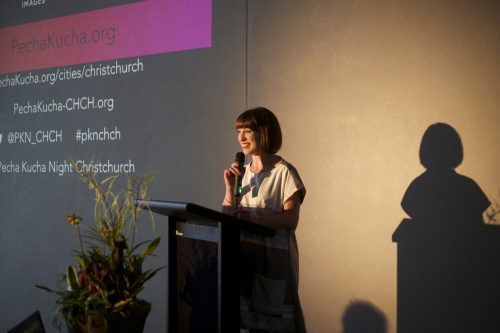
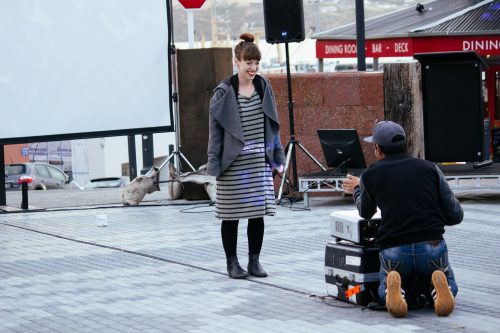





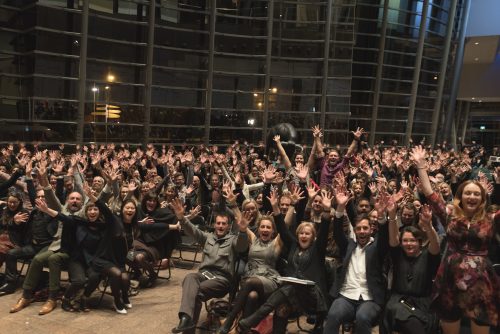
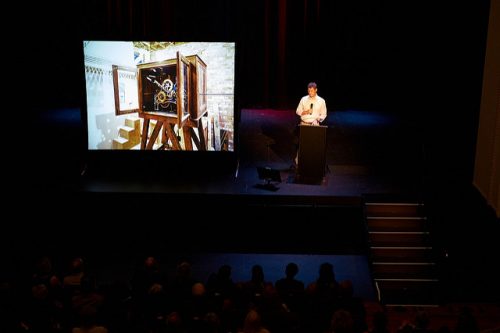
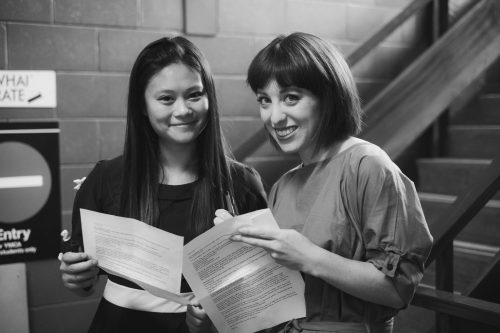
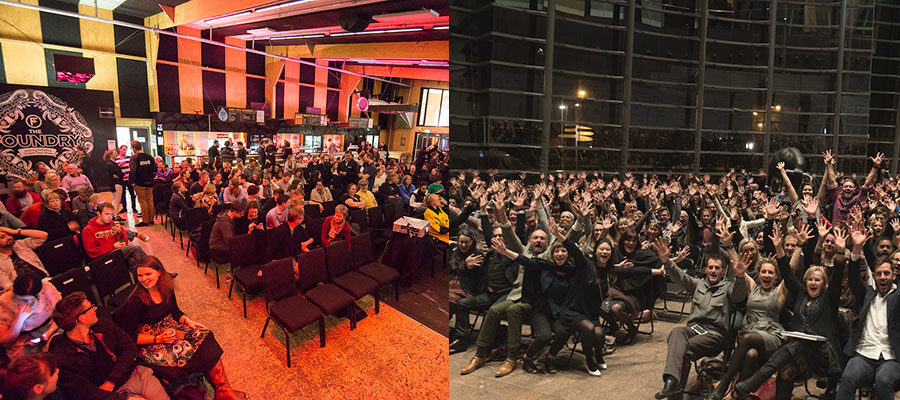
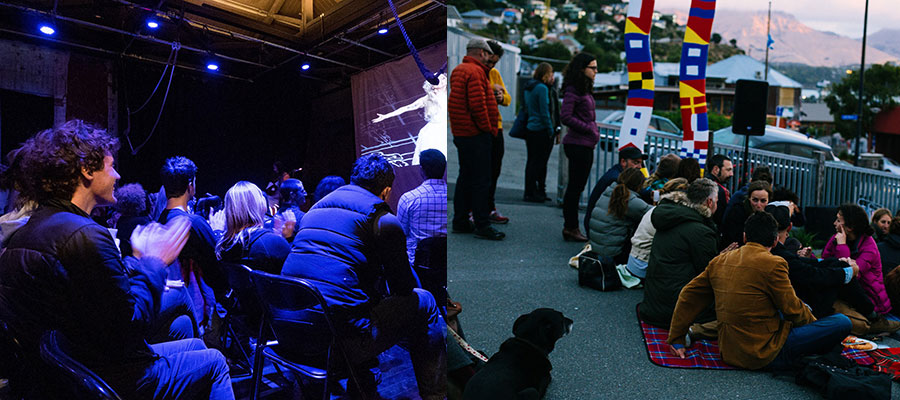





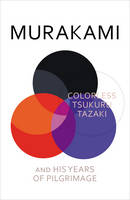






Add a comment to: Netta Egoz – the woman behind Christchurch’s PechaKucha Nights